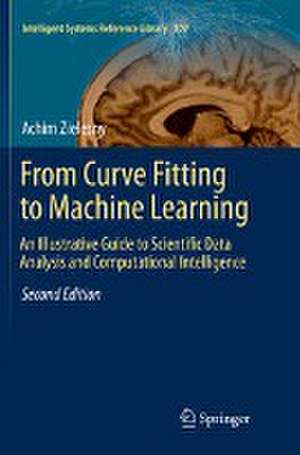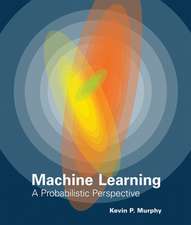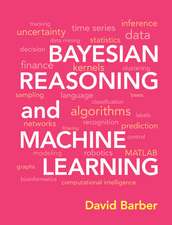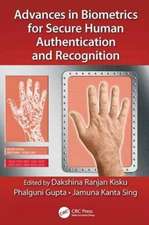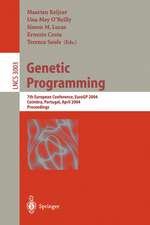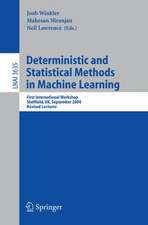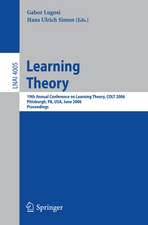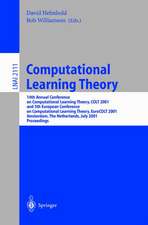From Curve Fitting to Machine Learning: An Illustrative Guide to Scientific Data Analysis and Computational Intelligence: Intelligent Systems Reference Library, cartea 109
Autor Achim Zielesnyen Limba Engleză Paperback – 22 apr 2018
The major topics are extensively outlined with exploratory examples and applications. The primary goal is to be as illustrative as possible without hiding problems and pitfalls but to address them. The character of an illustrative cookbook is complemented with specific sections that address more fundamental questions like the relation between machine learning and human intelligence.
All topics are completely demonstrated with the computing platform Mathematica and the Computational Intelligence Packages(CIP), a high-level function library developed with Mathematica's programming language on top of Mathematica's algorithms. CIP is open-source and the detailed code used throughout the book is freely accessible.
The target readerships are students of (computer) science and engineering as well as scientific practitioners in industry and academia who deserve an illustrative introduction. Readers with programming skills may easily port or customize the provided code. "'From curve fitting to machine learning' is ... a useful book. ... It contains the basic formulas of curve fitting and related subjects and throws in, what is missing in so many books, the code to reproduce the results.
All in all this is an interesting and useful book both for novice as well as expert readers. For the novice it is a good introductory book and the expert will appreciate the many examples and working code". Leslie A. Piegl (Review of the first edition, 2012).
| Toate formatele și edițiile | Preț | Express |
|---|---|---|
| Paperback (1) | 1624.04 lei 6-8 săpt. | |
| Springer International Publishing – 22 apr 2018 | 1624.04 lei 6-8 săpt. | |
| Hardback (2) | 661.14 lei 6-8 săpt. | |
| Springer Berlin, Heidelberg – 28 iul 2011 | 661.14 lei 6-8 săpt. | |
| Springer International Publishing – 22 apr 2016 | 1630.47 lei 6-8 săpt. |
Din seria Intelligent Systems Reference Library
- 20%
 Preț: 1050.57 lei
Preț: 1050.57 lei - 20%
 Preț: 1157.60 lei
Preț: 1157.60 lei - 20%
 Preț: 648.44 lei
Preț: 648.44 lei - 20%
 Preț: 650.08 lei
Preț: 650.08 lei - 20%
 Preț: 1005.64 lei
Preț: 1005.64 lei - 5%
 Preț: 968.88 lei
Preț: 968.88 lei - 20%
 Preț: 1052.67 lei
Preț: 1052.67 lei - 20%
 Preț: 1171.46 lei
Preț: 1171.46 lei - 20%
 Preț: 1164.84 lei
Preț: 1164.84 lei - 20%
 Preț: 815.83 lei
Preț: 815.83 lei - 20%
 Preț: 989.96 lei
Preț: 989.96 lei - 20%
 Preț: 1063.41 lei
Preț: 1063.41 lei - 20%
 Preț: 925.45 lei
Preț: 925.45 lei - 20%
 Preț: 504.37 lei
Preț: 504.37 lei - 18%
 Preț: 1113.26 lei
Preț: 1113.26 lei - 20%
 Preț: 1920.04 lei
Preț: 1920.04 lei - 20%
 Preț: 990.62 lei
Preț: 990.62 lei - 20%
 Preț: 651.57 lei
Preț: 651.57 lei - 20%
 Preț: 645.97 lei
Preț: 645.97 lei - 20%
 Preț: 660.16 lei
Preț: 660.16 lei - 20%
 Preț: 647.13 lei
Preț: 647.13 lei - 20%
 Preț: 654.05 lei
Preț: 654.05 lei - 20%
 Preț: 649.93 lei
Preț: 649.93 lei - 20%
 Preț: 648.11 lei
Preț: 648.11 lei - 20%
 Preț: 657.99 lei
Preț: 657.99 lei - 20%
 Preț: 656.84 lei
Preț: 656.84 lei - 20%
 Preț: 642.98 lei
Preț: 642.98 lei - 20%
 Preț: 649.60 lei
Preț: 649.60 lei - 20%
 Preț: 651.23 lei
Preț: 651.23 lei - 20%
 Preț: 653.06 lei
Preț: 653.06 lei - 20%
 Preț: 1002.99 lei
Preț: 1002.99 lei - 20%
 Preț: 645.14 lei
Preț: 645.14 lei - 20%
 Preț: 658.33 lei
Preț: 658.33 lei - 20%
 Preț: 644.98 lei
Preț: 644.98 lei - 20%
 Preț: 646.62 lei
Preț: 646.62 lei
Preț: 1624.04 lei
Preț vechi: 2030.05 lei
-20% Nou
Puncte Express: 2436
Preț estimativ în valută:
310.76€ • 325.12$ • 258.15£
310.76€ • 325.12$ • 258.15£
Carte tipărită la comandă
Livrare economică 03-17 aprilie
Preluare comenzi: 021 569.72.76
Specificații
ISBN-13: 9783319813134
ISBN-10: 3319813137
Ilustrații: XV, 498 p. 343 illus., 200 illus. in color.
Dimensiuni: 155 x 235 mm
Greutate: 0.72 kg
Ediția:Softcover reprint of the original 2nd ed. 2016
Editura: Springer International Publishing
Colecția Springer
Seria Intelligent Systems Reference Library
Locul publicării:Cham, Switzerland
ISBN-10: 3319813137
Ilustrații: XV, 498 p. 343 illus., 200 illus. in color.
Dimensiuni: 155 x 235 mm
Greutate: 0.72 kg
Ediția:Softcover reprint of the original 2nd ed. 2016
Editura: Springer International Publishing
Colecția Springer
Seria Intelligent Systems Reference Library
Locul publicării:Cham, Switzerland
Cuprins
Introduction.- Curve Fitting.- Clustering.- Machine Learning.- Discussion.- CIP -Computational Intelligence Packages.
Textul de pe ultima copertă
This successful book provides in its second edition an interactive and illustrative guide from two-dimensional curve fitting to multidimensional clustering and machine learning with neural networks or support vector machines. Along the way topics like mathematical optimization or evolutionary algorithms are touched. All concepts and ideas are outlined in a clear cut manner with graphically depicted plausibility arguments and a little elementary mathematics.
The major topics are extensively outlined with exploratory examples and applications. The primary goal is to be as illustrative as possible without hiding problems and pitfalls but to address them. The character of an illustrative cookbook is complemented with specific sections that address more fundamental questions like the relation between machine learning and human intelligence.
All topics are completely demonstrated with the computing platform Mathematica and the Computational Intelligence Packages(CIP), a high-level function library developed with Mathematica's programming language on top of Mathematica's algorithms. CIP is open-source and the detailed code used throughout the book is freely accessible.
The target readerships are students of (computer) science and engineering as well as scientific practitioners in industry and academia who deserve an illustrative introduction. Readers with programming skills may easily port or customize the provided code. "'From curve fitting to machine learning' is ... a useful book. ... It contains the basic formulas of curve fitting and related subjects and throws in, what is missing in so many books, the code to reproduce the results. All in all this is an interesting and useful book both for novice as well as expert readers. For the novice it is a good introductory book and the expert will appreciate the many examples and working code." Leslie A. Piegl (Review of the first edition, 2012).
Caracteristici
Serves as introduction to curve fitting, clustering and machine learning along with topics like mathematical optimization or evolutionary algorithms Outlines all concepts and ideas in a clear cut manner with graphically depictedplausibility arguments and a little elementary mathematics Extended, revised and interactive 2nd edition updated to theuse of CIP 2.0 for Mathematica 10 Includes supplementary material: sn.pub/extras
Recenzii
From the reviews:
“‘From curve fitting to machine learning’ is … a useful book. … It contains the basic formulas of curve fitting and related subjects and throws in, what is missing in so many books, the code to reproduce the results. … All in all this is an interesting and useful book both for novice as well as expert readers. For the novice it is a good introductory book and the expert will appreciate the many examples and working code.” (Leslie P. Piegl, Zentralblatt MATH, Vol. 1236, 2012)
“‘From curve fitting to machine learning’ is … a useful book. … It contains the basic formulas of curve fitting and related subjects and throws in, what is missing in so many books, the code to reproduce the results. … All in all this is an interesting and useful book both for novice as well as expert readers. For the novice it is a good introductory book and the expert will appreciate the many examples and working code.” (Leslie P. Piegl, Zentralblatt MATH, Vol. 1236, 2012)
